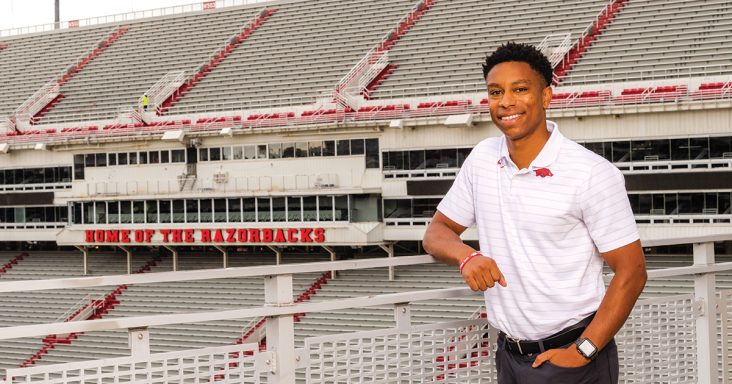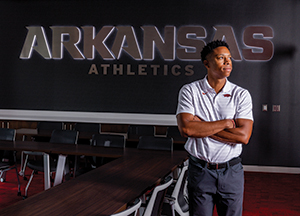Prentice helps Razorback athletes excel in first year of NIL
by August 30, 2022 7:56 am 1,873 views

Terry Prentice joined the University of Arkansas athletics department in March 2021 as a senior associate athletics director to oversee athlete brand development.
As college athletes throughout the country started exploring the uncertainty of name, image and likeness (NIL) endorsements last summer, Hall of Fame football coach Mack Brown coined a cautionary phrase.
“Don’t let your brand get ahead of your ball.”
NIL and its effect as a policy required some consideration and evaluation from Brown. The 71-year-old coach intended the message for his football players at the University of North Carolina following the NCAA’s decision to lift its ban on athletes earning money for things like endorsement and sponsorship deals, social media posts and personal appearances.
Still, Brown’s soundbite about priorities was a broader message that resonated throughout college athletics, an enterprise becoming increasingly business-driven and brand-oriented.
The University of Arkansas embraced the NIL era Brown referred to before the NCAA officially announced it. As a matter of fact, the UA set the standard for brand-building education for college athletes through a strategic hire.
In March 2021, former Razorback track star Terry Prentice accepted a job offer from Hunter Yurachek to join the UA athletics department as a senior associate athletics director to oversee athlete brand development. His job began four months before the NCAA’s landmark decision opened the doors for college athletes to start profiting from their NIL while maintaining their eligibility.
Yurachek, the university’s athletics director, said that the UA was the first athletic department to create a senior-level administrator position with that specific focus.
“There wasn’t another [job] like it around the country,” Yurachek said.
In a recent interview, Prentice said that in the first 12 months of the NIL era, approximately 225 Razorback athletes — nearly half — across all 19 sports signed agreements to monetize their NIL. Combined, they totaled more than $2 million.
“What we try to teach is that it all matters at the end of the day,” Prentice said. “Even a gift card to a restaurant does incrementally help a student-athlete.
“We are proud [of the first year] because we are a small state, but we are a [athletic] department that’s firing on all cylinders. Their play on the field helps with their notoriety and marketability. And we think we have a strong infrastructure internally to bolster [NIL] in year two. Because the department is winning and achieving at such a high level, you will see more success in NIL. They go hand in hand.”
CONNECTING TO FAYETTEVILLE
An even-keeled approach is one of Prentice’s many qualities demonstrating his bona fides to take on the groundbreaking job.
“He goes about his day very business-like with a very calm demeanor,” Yurachek said. “There are very few days you don’t see him with a smile on his face.”
That benefits Prentice’s broader role within the athletics department. In addition to his primary job of preparing Razorback athletes to maximize their NIL opportunities, he also coordinates diversity, equity, and inclusion (DEI) initiatives for the department, which has about 300 full-time employees. He is also the track and field sports administrator.
“He’s good at communicating with various people,” Yurachek said. “He’s very organized, pays attention to the details, and doesn’t get flustered. College athletics can be stressful, but there are very few days that he gets his feathers ruffled.”
Prentice excelled as a Razorback athlete and is as intelligent as his two degrees from the UA represent. He was an All-Southeastern Conference and honorable mention All-American decathlete. From 2009-12, Prentice helped the UA claim five SEC championships in indoor and outdoor track and field. He earned a bachelor’s degree in history in 2012 and a master’s degree in sports management in 2014.

Prentice, 33, began his career in fundraising with the Razorback Foundation (2014-2018) and the Ole Miss Athletics Foundation (2014) at the University of Mississippi. Before returning to Fayetteville, he was an associate athletics director at the University of Kansas (2018-2021), working for former UA athletics director Jeff Long.
Prentice’s initial path to Fayetteville was not direct. A Pomona, Calif., native, he graduated high school in 2007 and was a state champion and nationally competitive long jumper and hurdler. He turned down a scholarship offer from legendary Razorback track coach John McDonnell and opted for the University of Southern California instead.
“The fit [at USC] wasn’t right, and it was too close to home,” he said. “I was craving a college town.”
Prentice said his mother is a south Arkansas native, and both parents had careers in secondary education. In college, he envisioned a job as either a high school superintendent, sports broadcaster, agent, or something related to politics.
“About my junior year, I started seeing college athletics differently,” he recalled. “The industry was changing, budgets were soaring, and the visibility of the college athletics experience began to take off.”
Prentice’s connection to the university was one of the qualities that made him a target for Yurachek during his job search last year.
“He had a passion for this place,” Yurachek said. “I knew he would be able to relate well to our student-athletes and those in our community with whom our student-athletes would be engaging in this NIL space.”
NAVIGATION THROUGH EDUCATION
Prentice said one enjoyable aspect of his job is watching athletes’ maturity develop as they learn how to successfully juggle their priorities — with a new wrinkle.
“Some of them figured out this first year they only have so much time in a day or week to spend on academics, athletics, socially, their personal lives, and community interests they might have,” he said. “Now, there’s this thing called ‘NIL’ over here.”
The UA has more than 465 athletes. Prentice said some of them learned “hard life lessons” in the first year of NIL, an incredibly complex landscape full of ambiguous rules, strong opinions and risks that athletes must carefully navigate.
“When you have freshmen or transfers coming to campus who might be less-resourced, and now they have a passionate fan base and state that is behind them, coming to them with different opportunities, it can become overwhelming,” Prentice said. “We’re learning to navigate that and deal with those things.”
The UA’s primary tool to educate athletes about branding and business is its multi-faceted Flagship program. Announced in May 2021, it includes numerous partnerships and working relationships, including with the Sam M. Walton College of Business and the Office of Entrepreneurship and Innovation (OEI), which is in the business of developing entrepreneurs.
Sarah Goforth is OEI’s executive director. She said that when UA athletics department officials approached her in the spring of 2021 about collaborating, she saw it as an opportunity to engage students who might not otherwise make time for entrepreneurial training but would benefit from it for the rest of their careers.
“From day one, Terry understood that brand development goes hand in hand with entrepreneurial development,” Goforth said. “He and his colleagues were eager to leverage what we in OEI had already built for students across the university and not rely on external consultants as many universities were doing. They knew we had trust and relationships that would allow [Flagship] to get off the ground quickly and more deeply than our competitors.
“Not being a sports person, I would never have seen this opportunity coming if they had not approached us, and we certainly would have never been able to quickly come up to speed on what NIL meant for the business of college sports without them.”
Goforth said Flagship has matured mainly due to Prentice’s leadership and ability to quickly earn the trust of Razorback athletes, their families and the business community.
To further underscore the point, she said one only needs to pick a random athlete out of the crowd and ask them about Prentice’s impact.
“Most student-athletes I know have Terry’s number on speed dial,” she said. “It doesn’t matter if they are a social media phenomenon or a lesser-known, quieter kind of student. They see him as a mentor and a friend, and to do this across a large population of high-profile students takes a lot of drive, intelligence and integrity. Terry juggles all of that expertly without needing to be out front or taking credit. I give Hunter, Jon [Fagg] and Will [Landreth] a huge amount of credit for having the foresight to create that [job] and for hiring Terry at a time when most universities thought the new NIL rules were still a year away.”
